by riese & carmen
Season Six of Orange is the New Black dropped on Friday morning at midnight PST and exactly two members of the Autostraddle team cared deeply about this event: me and Carmen.
Since Poussey’s death in Season Four, it feels like our take on the show has verged dramatically from that of other critics’. Jezebel’s negative review of Season Six called Season Four “electrifying,” The AV Club gave As or A-s to Season Four’s last four episodes. Season Four earned a 96% on Rotten Tomatoes, a not-significant departure from the 98% granted to the prior three.
We do our best not to let issues of politics or representation cloud our ability to critique television on its artistry and storytelling prowess, but the program’s uneven and slipshod handling of racial issues, capped off by Poussey’s murder, overwhelmed those instincts. As discussed in our recent roundtable on how to handle TV that breaks our hearts, a full 36% of our readers told us they used to watch Orange is the New Black but didn’t anymore. We got backlash for covering it at all, although we stuck to the conviction that it was important to be part of the conversation. Surprisingly, season six — currently hovering at 85% on Rotten Tomatoes, up from season five’s 73% — struck us as, finally, the show finding some of its familiar legs again. So Carmen and I sat down to talk about it to each other and then, hopefully, to you.
Please be aware that this conversation references, with abandon, the entirety of Season Six, and therefore you should not read it if you don’t want spoilers.
Looking Back on Orange is the New Black
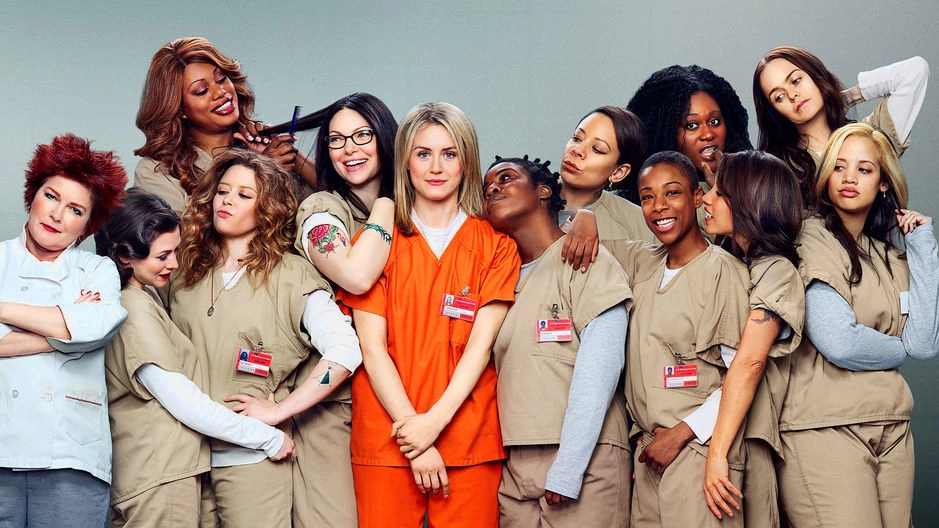
Riese: So for starters — we both used to be huge fans of this show, right? OITNB weekend has had a special place in my heart since 2013. I remember the day after my girlfriend of 3.5 years and I broke up, she called in sick to work so we could still marathon Season Two together! That’s how dedicated we were. Autostraddle went all out, too: for the first three seasons, OITNB content carried us, traffic-wise, through summer slumps. We did open threads, we had weird lists, we had viral tie-in posts, we had recipes for an Orange-themed dinner party!
Carmen: Oh for sure! I wrote about this last year, but when I first discovered Orange is the New Black, I binged it in a day! That’s pretty much been my tradition every year since. One year the show happened to fall in the middle of my 30th birthday trip with friends, and I was actually distressed about it! I waited until everyone in the house fell asleep from partying so I could watch the episodes on my laptop. Back in 2015, I marked the occasion by baking vegan chocolate cupcakes with orange frosting. It was serious for me.
Riese: Right, it was always one of the first weekends in June! Usually it’d fall right after A-Camp, which helped ease the post-camp comedown for me. Season one was a groundbreaking masterpiece. I didn’t like season two quite as much, but it was still incredible, especially in retrospect compared to what the future had in store. I loved season three, and the S3 finale — with the inmates breaking through a hole in the fence while MCC unloads busses of new prisoners — was one of my favorite season finales of all time. (Although we apparently didn’t recap it? I know I wrote this recap so I am very confused about it!) Then, of course, season four.
Carmen: After Poussey died in season four, I wasn’t sure I’d ever watch it the same way again.
Riese: Absolutely. It was, in my opinion, the most devastating lesbian character death in TV history, on just about every level — she was black, she was played by a lesbian actress, she was the show’s most earnest/hopeful character, she was part of a cute couple and friend group, she was killed by white writers to teach white people a lesson about racism, it was a tacky tie-in to current events, they tried to “humanize” her killer in that episode, etc. And, it happened the week after the Pulse shooting.
Carmen: Heartbroken isn’t the right word – I was betrayed and devastated. And yet, somehow I found my way back to the show again.
Riese: Yes, it’s like I gave OITNB a 150/100 so when it lost 100 points for me, it still had 50 points! Which is more than most shows. It’s still overflowing with intriguing, dynamic and often hilarious characters who’re constantly being thrust into unfamiliar and challenging situations. It is still introducing some ignorant people to some of the (compromised for fiction) realities of America’s prison-industrial complex.
Carmen: It’s funny, right? When you watch a show that’s been on air as long as OITNB – and has been an awards contender almost every year – on some level you end up playing the “ranking game.” You start to wonder how this season measures up to what you’ve seen before.
Riese: This is the first year we’re not recapping every episode. It feels weird not to! But we’re in a financial hellmouth at the moment and can’t afford to put money into something so many of our readers have entirely checked out on — recapping an hour-long drama takes, at least for me, two full days of work. Although I hope to get a few stand-alone pitches on the season, somehow. We’ll see!
Carmen: Is it ok to admit that I already miss our recaps a bit? But there’s a silver lining because this is giving me a chance to do what is ultimately one of my favorite things, which is pick your brain about television!
Riese: ONE OF MY FAVORITE THINGS IS TALKING TO YOU ABOUT TELEVISION so we’re both living our dreams.
Carmen: Honestly, I was shocked at how high I would rank this season. I agree with you – season one burned brighter than the sun! It ushered in a new era of television. My personal favorite will always be season two. I adored what Lorraine Toussaint did with Vee and I consider it to be Poussey’s finest character work. Season three felt uneven (sorry Riese! I really disliked the “Cult of Norma” storyline!). That said, I agree that its finale of the inmates breaking out to the lake was absolutely breathtaking.
Riese: Oh, I agree about the Cult of Norma storyline, which I think I attacked in my recap or writing about that season so I might be part of the reason you hate it! [finds recap] A-ha yes, I wrote: “I hated this storyline SO MUCH (and couldn’t buy for one second that Poussey would get involved with it). It didn’t make sense on so many levels and took up valuable time that could’ve been better employed.” But a lot of our readers disagreed! I felt like it was absurdity for absurdity’s sake, something we often see in the work of Ryan Murphy, actually.
Carmen: Seasons four and five are linked in my head as, quite frankly, painful.
Riese: Yeah, season five had its moments, but was hard to actually enjoy, especially considering the ongoing WHITENESS OF THIS WRITER’S ROOM. This is not a hard problem to fix! And I think this year’s writer’s room was slightly more diverse, but … hardly.
Orange is the New Black Season Six: To The Max
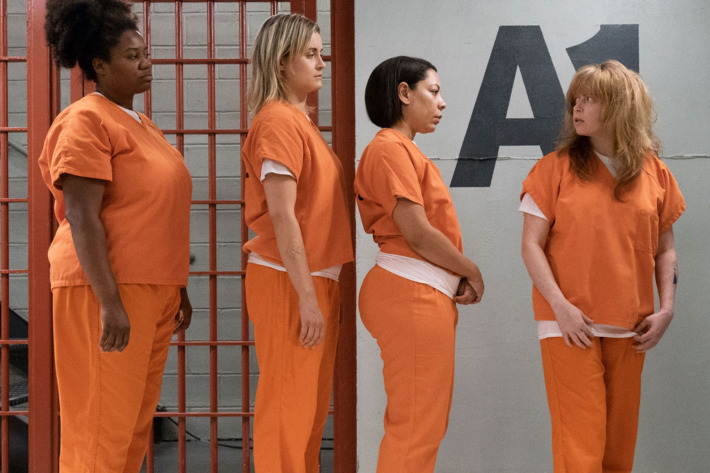
Carmen: So what about now? I think that season six was a surprising reset and a mostly solid return to form. I’d probably place it after seasons one and two, and somewhere around season three. When I first started this year’s binge, if someone predicted that’s where I’d land, I would have laughed at them!
Riese: This season’s first three eps were… bleak, especially with all the major characters either missing or separated, guards physically and emotionally torturing the inmates, and the system out in full force destroying everybody’s health and will to live. The heartless detectives. The prison’s reluctance to medicate Suzanne and return her to Gen Pop? Our only levity was Suzanne’s hallucinations! (The Cha Cha Slide was downright delightful, I admit). Ugh, and the callous denialism that enabled “Fantasy Inmate.” The savage asinine new guards! Meanwhile Doggett is going to a fucking amusement park WITH HER RAPIST! I stayed up ‘til midnight to watch the first few episodes and I’ll tell you what, I did not sleep well that night! Usually OITNB starts okay and gets darker as we plow forward, so I was terrified about where this might be headed.
Carmen: That was my exact fear! And for the exact same reasons. I finished episode one and paused the credits to clutch my stomach. Based on precedent, I had a bad feeling about where we were headed. Eventually the show found spaces for levity and balance as they progressed. Those later moments were a welcome breath of fresh air.
Riese: Although I resent centering an entire season’s conflict around two characters we’d just met and don’t truly care about, it was at least refreshing for Litchfield’s gangs to not be organized by race. I know the race-based gangs and housing were accurate depictions of Piper Kerman’s experience at prison camp and how many/most prisons are organized in the U.S., but this show’s handling of race had devolved to an unendurable place, and I appreciated the break from literal Nazis, constant racial slurs, and the writers’ mind-boggling suggestion that reverse racism exists and that poc-vs-poc racism is just as insidious as white supremacy.
Carmen: YES!! And somehow that’s still putting it kindly! Let’s be real, OITNB has never ever gotten their racial representation perfect. I don’t believe they genuinely ever made it their priority to get it right, either. If they had, they wouldn’t have maintained their famously white writers’ room for as long as they did. But, the last two seasons were horrific! At least early seasons put a spotlight on the humanity of disenfranchised women of color. It was glorious. Along the way, they brutally lost track of that.
I think this season rediscovered those moments for humanity, and the show was stronger for it. I don’t know if it’s because of the prison shake up, which forced new alliances across racial lines (Suzanne has a great monologue that in Max she’s assigned a color – meaning her new pink prison uniform – and certain colors hate other colors. Navigating that newfound terrain is complicated!) or if it’s is the result of other behind the scene changes. Before season six debuted, Jenji Kohan acknowledged that season five wasn’t their best showing.
Changing Winds
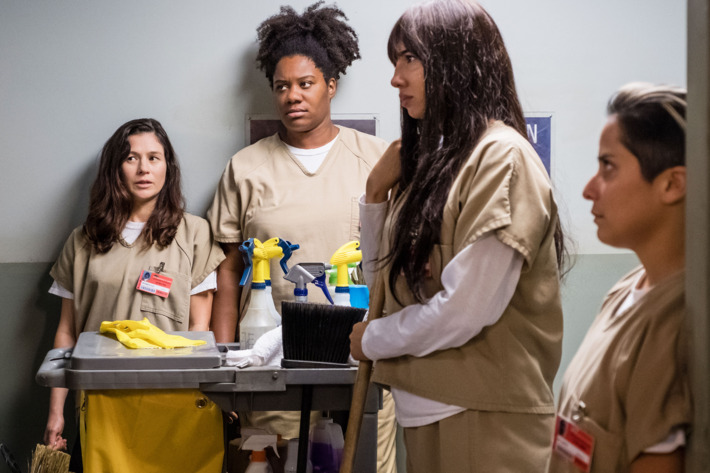
Carmen: When I say that OITNB once again committed themselves to the humanity of their women of color, that doesn’t mean that they only show those characters to be one-dimensional angels! To me, one of the most human moments of the season is Aleida deciding to continue smuggling drugs into the prison, despite discovering Daya’s addiction. It’s the only way she can get enough money to save her other children. Watching her quietly weigh the pros and cons of that unbearable decision while sitting at her kitchen table was at once terrible and powerful.
Riese: Absolutely, especially following her foray into multi-level-marketing. In 2014, Al Jazeera did a four-part series on MLMs which included an investigation into how Herbalife, a pyramid scheme, preys on Latinx communities. They wrote that Herbalife “targets poor, often-uneducated Latinos, many of whom are living in the country illegally.” In OITNB, we see how that strategy was effective with a former convict who has similarly limited employment options post-release.
Carmen: Taystee’s delicate relationship with Tamika (CO Ward) is another excellent example. Early in the season Tamika, who knew Taystee back when they were both working at their neighborhood fast food joint as teenagers, tries to tell Taystee that she’s in prison because of her own life choices. Taystee reminds her that they traveled on the same road – the only difference between them is happenstance. That kind of bare honesty between two women is what Orange is The New Black excels at when it actually tries.
Riese: Another reverse-course that stood out to me was how many characters who’d resisted growth for so many years were genuinely evaluating past choices in order to make responsible new ones. It’s important of course to note that for them it’s only been a few weeks since Poussey was killed and for us it’s been two years. But the riot changed people. Specifically: Piper, Alex, Maria and Gloria deliberately did what they could to opt out of gang affiliation. They didn’t always succeed, but they kept a level-headed emotional distance. Characters who’d always laid low but often ended up sucked into the fray regardless — Taystee, Cindy, Flaca, Suzanne and Doggett — didn’t feel even remotely tempted to opt in.
That made Red’s stubborn pride, which I thought peaked last season, really stand out. Everybody else wants to move forward and she can’t seem to. At this point, she’s not just being prideful — she’s being an idiot. I’ve never been a big fan of Red, but I truly dreaded her scenes this year. Lady, you are what now, 70? GROW THE FUCK UP!
Carmen: Oh man, when Red finally has the chance to see her grandchildren, but gives it up at the last minute for the opportunity to throttle Freida instead? I was so freaking mad at her! I actually like Red, mostly because of her tenderness towards Nicky, but I agree – she’s become stunted.
Riese: Also she was very bitter about her children not “covering” for her, but like… they didn’t make you do what you did, either?
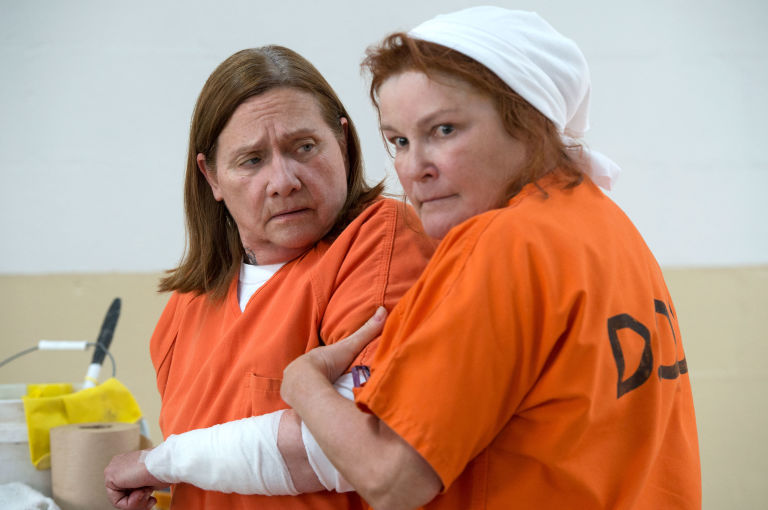
Riese: Anyhow, there were a LOT of characters missing! We saw Big Boo and Ouija very briefly, and heard nothing from or about Maritza, Watson, Soso, Yoga Jones, Allison, Pidge, Brandy, Norma, Leanne & Angie. I was pleased to be rid of Leanne & Angie, but I missed Soso, Watson, Big Boo and Maritza. Isn’t it downright bizarre that Cindy and Taystee wouldn’t at least ask about Watson? Still, paring down the cast was a good call.
Carmen: I figured we were in for a cast cutting after they they split up the inmates “at random” onto buses at the end of last year. You’re right, it was a good call. Some of those characters had taken their stories to the end of their rope. I’d be a happier person if I never heard from some of them again (and yes, I’m talking about Leanne & Angie).
I think I missed Big Boo’s relationship with Doggett the most. I’m thankful that one of this year’s course corrections was to finally move Tiffany out of that relationship with her rapist and let her recognize that he was emotionally abusive! I would have liked to see her work through some of her healing with Boo, who warned her about that asshole for the longest time. Plus, I have a soft spot for Lea DeLaria and her important history (herstory?) in lesbian pop culture.
Riese: Absolutely same. And yes, some of OITNB’s best arcs have resulted from unlikely allyships like Big Boo and Doggett’s (I’m also thinking of Sophia and Sister Ingalls, or Poussey and Soso). In this season, forcing the inmates into new living arrangements and alliances was another solid, compelling choice.
Carmen: It helped recharge the show! There were so many awesome, but unexpected pairings this year! My favorite was probably Cindy and Flaca. They flowed surprisingly well together. It wasn’t just comedy. Flaca really had Cindy’s back. She was the one who helped her find a way to forgive herself for betraying Taystee. That brief moment of healing was really touching to me, and both actresses rose to the occasion.
The New Kids On the Block
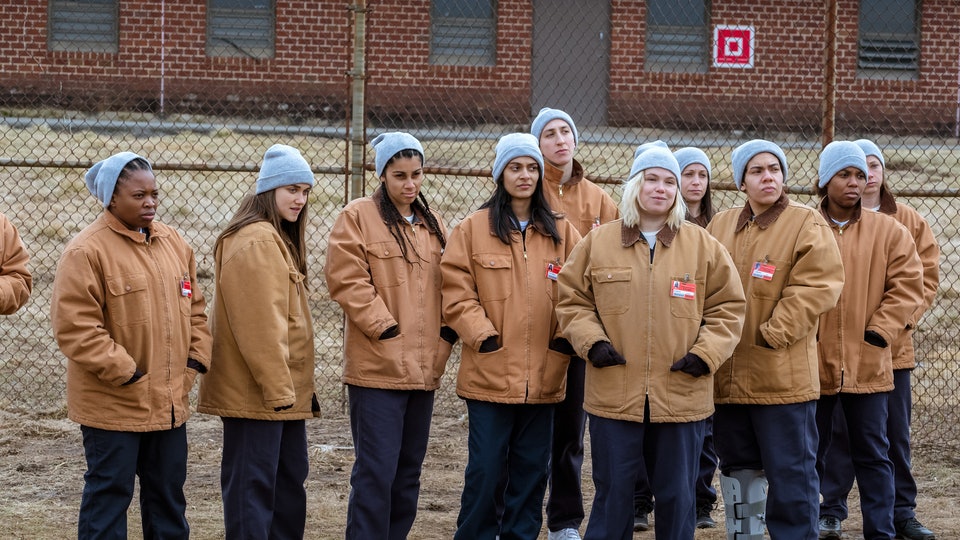
Riese: So, let’s talk about the new characters. Badison. Why? Who’s terrible idea was this?
Carmen: I can’t help you there! At first I thought she was kind of funny in a walking disaster/comic relief way, but then as the season progressed it slowly dawned on me – Oh no! She’s always like this!
Riese: Her flashback was revelatory, but never came close to explaining how the hell she became Carol’s second-in-command. Her Boston accent was an insult to humanity. (Also not everybody in Boston has an accent! Her high school classroom scene felt like an SNL skit.) She was obnoxious, stupid, and lacked charisma. I wanted her to fall on a knife!
I also really enjoyed Adeola, the evolutionary anthropologist from Lagos with a dry sense of humor who got in on Gloria’s “Cult of the Holy Virgin”? I hope we get a flashback from her next year!
Carmen: Oh hey, the Cult of the Holy Virgin! El Día de Anunción de la Soledad!
You said you didn’t feel invested in them, but I liked Barbara and Carol Denning (the “Little Debbie” murderers). They were enjoyable as one-off Big Bads, and I will always welcome Mackenzie Phillips on my screen. I thought some of her work with Natasha Lyonne was excellent, especially taking into account their shared past public struggles with addiction.
Riese: Nicky has really evolved these past two seasons after some erratic relapses, literal and otherwise. Her refusal to accept legal representation from her father, though, was part of what concerned me in the first few episodes — it’s painful to see these characters you’ve grown to love repeatedly bite the hands that attempt to feed them out of pride or resentment. Sometimes you’ve gotta suck it up and take help from wherever it comes. As was said in another fictional prison, The Shawshank Redemption, “you gotta give ‘em hope!” Every force in the world is against these women, but when there’s no hope, it becomes torture porn.
Carmen: Also – and this is shallow of me – I adored Carol’s glasses! “Young Carol” was kind of hot? In a madcap queer way. I dunno. I haven’t processed this enough, clearly.
Riese: I LOVED HER GLASSES TOO! I adored all their flashback fashion. I also liked that we got a genuine true crime murder story out of the two sisters, because I am demented.
Yes Daddy I Daya
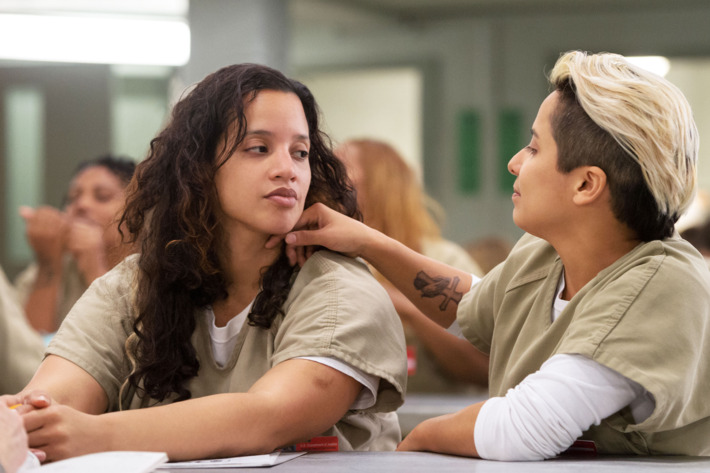
Riese: So, let’s talk about Daddy, a lesbian character played by Vicci Martinez. Pretty easy on the eyes.
Carmen: I’ll admit it! I spammed our work channel on slack this weekend with all of my Daddy thirst! I’m that person!
I think she delivers one of the stand out performances of the season. You want to love Daddy, but at the same time, you know you’re not supposed to. She’s undeniably sexy, and purposefully uses her charisma to manipulate the women around her. Whether it’s inside the prison as a drug dealer or on the outside as a high end pimp – she’s genuinely protective of her “girls.” She also puts them in harm’s way. It’s a complicated knot to untangle. OK. Listen. When Daddy first did that little eye flick thing and licked her lips, I knew I was a goner.
I had a small crush on Vicci Martinez when she was a finalist on The Voice in 2011 and now she’s dating one of her OITNB co-stars (Emily Tarver, aka CO McCullough)? Awww, c’mon! It’s so sweet!
Riese: It was also an interesting choice to have Daya intentionally go “gay for the stay.” She pointed out that for her, “gay for the stay” meant forever because her hopes of getting out are pretty minimal.
Carmen: Ohhh, I’d actually love to hear your thoughts about this! It was a swerve in the show’s development that I didn’t see coming! I’m not an expert on “gay for the stay” obviously, but I’m super interested in how we think about these kinds of liminal sexualities.
Riese: I mean — we got to see Daya hook up with a girl! Plus it was a POC/POC relationship, which’s rare. As Gabby pointed out in Season One, too, none of OITNB’s Latinx characters were queer and although Flaca and Maritza were a shippers’ dream, we never got a queer Latinx regular. Then we suddenly got one new Latinx lesbian AND an existing Latinx character got turned! Also, I feel in my heart that everyone is gay, so this change of course was an accurate depiction of my heart. We’ve seen the “gay for the stay” dynamic on OITNB before, like with Nicky and Morello. It’s hard to know what this relationship means to Daya — she’s on drugs and need drugs, so the whole thing could be entirely presentational. But, their chemistry was palpable and also, Daya is fucking tired. The shit she’s been through? She deserves a nice butch to take care of her. Of course, Daddy’s version of “taking care” isn’t… well, it’s a little fucked up.
Carmen: I feel conflicted about Daya and Daddy. They have off the walls, crackling, chemistry. At one point, Daddy strokes Daya’s cheek and calls her “a good girl” and I got a little weak in the knees! (I mean, I’m only human!)
Riese: My other activity this weekend besides watching OITNB was our next Lesbian Sex 101 post, this one about sub-identities mostly within kink, which included Daddy / Good Girl. So my eyes popped out of my head during that convo.
Carmen: There was an element of them wanting to protect each other, and do right by each other, that felt genuinely sweet. On the other hand, Daya is quickly becoming an addict and Daddy isn’t intervening at all. In fact, she seems fine with letting Daya make risky behavior choices as long as they’re for Daddy’s benefit.
Riese: For sure. I think — and maybe I’m just rationalizing here, as I am wont to do in favor of a strong ship — to me, that was just a maximum security prison edition of a relationship dynamic I think endures in real life all the time, even in the lives of people we love or consider ethically unambiguous. We’ve all known people who enable their partners in myriad unhealthy ways in order to keep them close, you know? And… when in Rome. It felt to me like Daddy was dealing with so much inner turmoil over her failure to maintain the drug pipeline, please Barb, and take care of her group. While dealing with, I’m sure, unresolved guilt over the fate of her girls in her pre-prison life. Speaking of, she was similarly complacent with her girls on “the outside” using drugs and alcohol to get through dates or to otherwise just enjoy the high-roller lifestyle. I’m unsure if she saw Daya’s drug addiction as a genuine problem, or just the way of the world? I’d also assumed she was unaware that Daya hadn’t been an addict or pill-popper in the past. But I also experienced intense Daddy thirst, so.
Carmen: Yeah, I can see that. Daddy thirst is A REAL THING! And — this is just now occurring to me! — are Daddy and Daya a reincarnation of Aleida’s relationship with Cesar? Mind blown.
Riese: Oh shit.
Mazel Tov, Piper & Alex

Carmen: OK! Speaking of Litchfield’s major lesbian romances! Did you have any thoughts about Piper and Alex’s wedding? I think the show’s biggest magic trick yet might be convincing me to be invested in Alex and Piper again after all these years.
Riese: Yeah, Piper and Alex of all people ended up granting a certain levity and sweetness to the narrative without valorizing Piper. Their renewed relationship gave them both something to live for, so to speak, but also something to behave for, an exit route from nihilism. Piper’s unprompted monologue to Beth in episode two started setting that up: “I used to think that there were two versions of me. There was the version of me in here, who smoked crack and had a gang who punished people for crossing her. And then the real me… she was out there, and she hadn’t done any of those things. But now I realize there isn’t another me. There’s only this me. And I don’t know what the fuck to do with that.”
Still, I think the reviewer from Vulture really hit the nail on the head with what they wrote about Piper’s somehow still-employed wide-eyed naivety about her own privilege, how that privilege is perceived by other inmates, and the unbalanced weight of her story vs. Taystee’s during their exchange at the beauty salon. Which brings me to….
The State vs. Tasha Jefferson
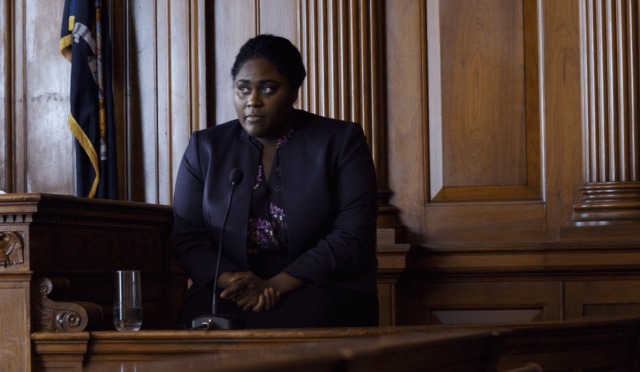
Riese: So — Taystee ends up on trial for the murder of Piscatella. Here’s what got to me: how was she ever supposed to win that trial if nobody presented an alternate theory of the crime? I’m not sure the whole Cindy/Suzanne withholding information storyline functioned effectively, although it gave them both a lot to wrestle with as people this season. I mean, if we know anything about what happens when cops kill people, it’s unlikely anybody would’ve believed or investigated what Cindy and Suzanne witnessed, had even they testified on it. But at the same time… I feel like there was a window of time in which Cindy could’ve told Taystee what went down, and explained that she didn’t know Piscatella had been killed or that Taystee was being accused of it when she gave her initial statement to investigators. I don’t know, that whole thing was a little convoluted, and honestly quite clumsy in parts.
Carmen: I guess now we are getting to the really painful parts. On some level, I knew Taystee was going to lose her case. That was realistic. Still, there was this glimmer of hope. I really loved that black women and Black Lives Matter came to Taystee’s aid. That Poussey’s name was getting written in the papers. In its own way, it was beautiful.
Riese: And to have her walk into Gen Pop and get greeted by applause instead of theft and hostility? Praise Lesbian Jesus! Litchfield inmates so rarely choose the right person to valorize, yannow?
Carmen: I almost thought Taystee might finally get a win. But, in hindsight, of course not.
Riese: Same. Her testimony in the trial made me cry. I was holding my hand over my face so that I wouldn’t see “guilty” show up in the captions when the verdict was delivered. As it turned out they’d eliminated sound for that clip anyhow, which was a merciful choice for an often-merciless show. It just blew my mind that the ACLU wouldn’t try to get another witness to testify that Piscatella left the pool alive. There were twelve women down there, half of whom had nothing to lose by testifying to that fact!
Carmen: It’s implied early on that Freida gave up Taystee to the investigators before she gave up Red (she says “I already gave you the black one”), but what about everyone else? I understand Cindy couldn’t perjure herself, but what about Gloria? Alex? Piper? I can’t think what any of them had to lose… well, other than their truncated sentences. I suppose that was the point, but they could’ve made that clearer on camera.
Riese: Also, what happened to the other medical examiner the ACLU hired? We never saw that in trial. I know Taystee wouldn’t have had a shot anyhow, because you know, institutionalized racism, but to leave those avenues unexplored felt unrealistic and confusing.
Carmen: Honestly, Taystee’s trial should’ve been an entire episode by itself. That’s probably the biggest pacing issue I had this season.
Riese: Yes. So much of her story was rushed in favor of less important things, like literally every word out of Badison’s mouth. And I was surprised there wasn’t more attention paid to jury selection. I feel like Taystee’s lawyer would’ve pushed for a more diverse group.
“Be Free”
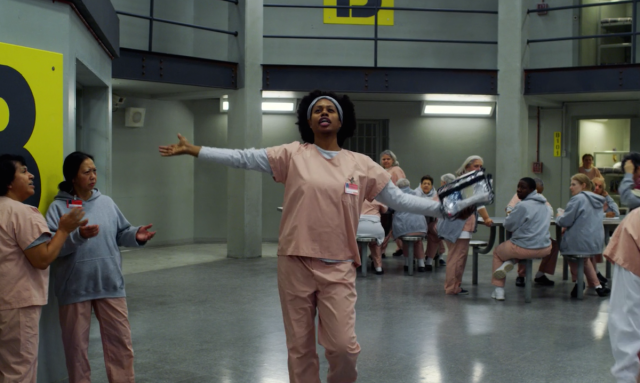
Carmen: Surprisingly, I didn’t hate the turn towards focusing on Piper at the end. I think letting Piper out early with a full season left is a bold move. At the same time, the finale parallels would have landed even harder if we spent more time with Taystee. It would’ve clearly established Piper and Taystee as co-leads of the narrative for the audience.
The show already laid groundwork for that when the two are alone in the hair salon and Taystee essentially tells Piper that she’s a living representation of privilege. Which is absolutely true – that only becomes more obvious when Piper’s granted early release. And of course also, the final shot of Piper pulling away from Litchfield in her Subaru Outback just as Taystee goes back in the U.S. Marshall van.
Riese: Yeah, I think moving Piper outside the prison was a good call — I assume the writing and publication of her memoir will be front and center for season seven. But Diablo standing outside with that bouquet of flowers while Blanca ended up transferred to ICE, after MCC unveiled their plan to expand into Immigration and Customs Enforcement? Oof. I did resent the writers for setting us all up for that, and felt like it was cruel and unusual to tell her she was getting out, only to transfer her to ICE. But of course, under this administration? Unfortunately totally believable.
Carmen: That gutted me! I did not it coming! I knew something was up with Flores. But, I didn’t expect THAT.
To be honest, I’m still working through my feelings about the finale. It was weird. I felt frustrated by the systematic inequality presented to us, obviously. At the same time, I also walked away going, “OK, Orange is the New Black, this is how you do it. This is how you depict reality without devolving into violence and torture porn.” Give me space to be beside myself and frustrated and moved in my spine to make a change (or keep making changes) in this country because of these women’s stories, but allow me the room to do that without also feeling like you’re exploiting your most vulnerable characters for sport. Finally being able to have that space again almost felt a little like a relief? A depressing relief? I don’t know.
Riese: Yes I agree. Also, I’m happy for Sophia getting a handsome payout and early release, although I suspect, based on Laverne Cox’s schedule, that this might be the last we see of her. Which’s too bad, I’m very curious how her life will proceed on the outside. Bless us, everyone, that we did not need to see her get tortured any more this year! Damn, this is a low bar.
Carmen: I’ll always be thankful to OITNB for introducing me to Laverne Cox. Her talent and her activism have been definitive for me. I’ve been thinking about her legacy on television a lot this summer, actually. Particularly with Pose garnering such attention on FX. In a few short years, her work has already opened so many doors. It’s undeniable, you know?
Anyway, I wish we could have spent more time with Sophia over the last couple of seasons, but I respect the ways that Laverne’s schedule made that prohibitive. I was happy to see her leave, smile on her face, comfortable in her skin, and quoting James Baldwin. It’s probably the first true “happy ending” we’ve seen on the show so far? Both she and her character deserved it.
Riese: OITNB’s incorporation of Aleida this season, as well as how Wentworth kept Frankie on the show while moving her outside of the prison, left me with little doubt that Piper will remain a season seven focus, for better or for worse. But I’ll have Jenny Schecter PTSD if we have to deal with another “everybody’s mad at me for writing Lez Girls” situation.
Carmen: Oh no! why would you put that out in the air???? Welp. Now I’m definitely going to have nightmares.
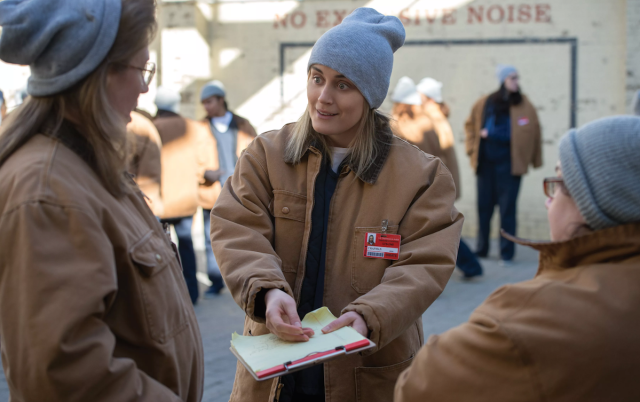
Riese: My other hope for next season is that The Innocence Project or something akin to The Last Defense picks up Taystee’s case. She’s become the star of this show and I can’t bear to see her weather any additional blows. Shit has been bad enough!
Carmen: I hadn’t thought of it, but yes! Absolutely! That would be an excellent choice for how to end Taystee’s arc and how to end the show. It would also give Orange is the New Black a chance to go out on a high note by lifting up the activist work already being done around the prison-industrial complex, which they should be doing anyway.
Riese: Just two brief things I feel are worth noting before we sign off and let our readers tell us how they feel about the season and what if anything they’d like to read from our team about it — because as I’ve realized during this conversation, there’s SO MUCH TO SAY — one: they killed Maureen. The last we saw of her, she was being rushed out of medical by two stormtroopers who said she had elephantitis on her face. Alex said she died at the hospital, although the newspaper article we saw said she was “found dead.”
Lastly, G-ddess bless Chang, who Fig says they found “sleeping inside a hollowed-out deer carcass.” *Chef’s kiss*





